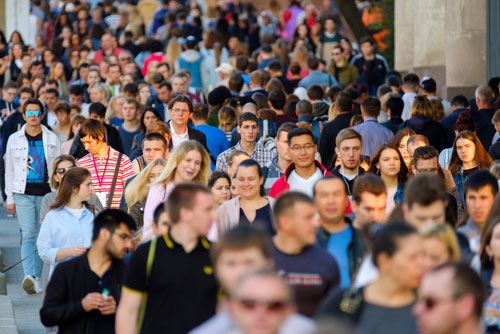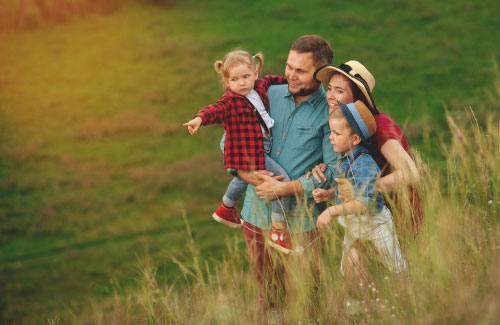Should we stop having kids in order to be truly sustainable and save the planet?
In order to meet our demand, human activities are changing and destroying ecosystems at an incredible speed that is actually 100 to 1000 times faster than natural selection would be.
Deforestation, biodiversity loss, ocean acidification, soil depletion, permafrost melting, climate change… These are, to name only a few, some of the reasons to support the sustainability thesis everyone is talking about these days: we’re not really making a brilliant job down here.
Just recently we’ve written about how it will take millions of years to recover from human-caused biodiversity loss. It was truly surprising to learn that on average, extinction rates are 3 orders of magnitude higher now compared to the mass extinction that wiped out dinosaurs.
The problems mentioned above are being addressed and discussed among both scientists and ecologists, usually during sustainable development-related conferences.
Between many possible causes, there is one question that often comes to light – are we too many people inhabiting planet Earth?
Some studies made on this topic suggest that our ecosystems have a limit to how many human lives they can support and that we should worry about the way our demography evolves.
So can it be that if we grow too much the planet won’t be able to handle it? And if so, should we stop having kids in order to save and preserve planet Earth as we know it?
Let’s take a wider look at these important questions.
- Related:
Demographic Impact: Are We Too Many Inhabiting Earth?

Right now, we are 7,6 billion and growing.
Forecasts are that we’ll reach 9,6 billion in 2050 and 11,1 billion in 2100. In spite of this, we are growing at a much slower rate (1,09%/year) when compared to the ’60s. By that time, the annual growth rates were really high, having reached a peak of 2,09% in 1968 – meet the famous baby boomers.
Since then, we are progressively having fewer kids, especially in developed countries where education rates are higher. By 2100, it is expected that the population annual growth rate decreases to 0,09%, but this is still a huge number if we think we’re multiplying it for 11 billion people.
There are also data pointing out that population growth in Europe and North America has already started to slow down, with quite some news being published around why millennials are having fewer kids than the previous generations.
Some arguments have to do with the hard economic times, with the current house market speculation and house prices. Others defend it’s because more women are pursuing careers or because of increases in student debt.
In the end and setting the why aside, this means that undeveloped and developing countries are actually the ones most contributing to population increase, with China and India – which together represent 36% of the population – fighting for the pole position.
But what will happen if we keep growing?
If we go back to the late 18th century, Malthus had already written an essay on this topic. He argued that it was likely we’d continue growing until a point where there wouldn’t be enough resources for everyone.
Another study made in the late 20th century by Meadows et. al. also concluded that if the trends in population growth, resource depletion, pollution, food, and industrialization remained the same, the planet would reach its limits to growth in the following 100 years.
Both these ideas assume that the Earth is essentially a closed system, except for the exchange of energy. So basically we already have all the matter and resources we’ll ever have – well… at least until Elon Musk starts bringing samples from Mars, which does not look like an easy task, at least for now!
Can One Less Baby Really Have An Ecological Impact? Should We Not Have Babies At All?

More recent studies support the idea that having kids is actually bad for the planet.
According to a study published in 2017, the most sustainable act (in developed countries) would be to decide to have one less child, followed by living car-free, avoiding long flights, and eating a plant-based diet. This would reduce our carbon footprint by 58 tons of CO2 per year.
It makes sense, doesn’t it? One less child on Earth means less food to produce, less energy to spend, and most of all, it’s a whole life of consumption and impact on the environment that is ultimately avoided.
If we followed this rhetoric, then the most ecologic and sustainable gesture that one could have would be to have no children at all.
This is what is now pushing some environmental activists to claim the duty to no longer have children and it’s also what motivates some citizens with deep-rooted ecological beliefs to give up child-rearing. Yet, while it is obvious that every child on earth has a considerable potential impact on the environment, the problem is not as simple as it seems.
It may seem obvious that if you decide not to have kids you’ll reduce your carbon footprint. Therefore, you’d have a smaller contribution to the global carbon footprint of humans on the planet, which reached 36MCO2 in 2016.
But would our personal decision to have one (or two or three) fewer children make any difference to the ecological state of the Earth? In fact, it wouldn’t be relevant.
It would be just like a drop of water in an ocean and humankind would be producing just as many goods and consuming barely the same amount of resources and energy. But what if everyone else also decides to have fewer children?
- Related:
What If Many Couples Decided To Have Fewer Kids? Will We Then Be Having An Impact On the Planet?
Whilst having one less child doesn’t change the overall ecological scenario, one could argue that “if everyone decided to do it, it would have an impact”.
Indeed, from a demand-supply perspective, it would. That’s the root of the ecological recommendations we often get as citizens when we’re asked to recycle our waste, eat less meat or use public transportation more often.
In the end, the expectations are that a significant number of people will follow the lead and that companies adjust to our preferences in their search for economic growth (or for something). These actions could ultimately change socio-political and economic systems – that’s the belief behind our power as consumers.
And if there’s something the Coronavirus is unraveling is just how dysfunctional our global economic system is. But in the case of (not) having children, this assumption raises two very serious questions.
The first is a matter of whether this significant number can realistically be achieved. Empowering people to refuse disposables or save water and power is one thing. But can we really imagine that apart from a few really committed ecologists, many individuals would give up on having (less or no) children to reduce their carbon footprint?
After all, we’re talking about something that is “naturally” inscribed in our genetic heritage and in the architecture and chemistry of our bodies.
The second point has to do with who would be the ones willing to give up on having children?
For instance, let’s say the radical ecologists that argue that people should have no children do as they evangelize. We know that our beliefs and character are mostly defined by the age of 7, strongly influenced by the education we get from our parents.
Now imagine the most engaged ecologists of our society stop having children: it would be harder for them to pass on their beliefs. And if this happens, the number of ecologists, not very high today, would even be smaller tomorrow, as well as their political weight. And this wouldn’t be any good for the planet, right?
It’s Not Only About How Many We Are. It’s Also About How Much We’re Consuming

Furthermore, it’s not only about how big your family might be – your consumption habits also have a really important part to play.
For instance, different countries have different cultures, habits, and needs so the amount of resources a baby (and afterward an adult) will consume depends on where this person is born, raised, and stays living. Therefore, we shouldn’t generalize and say that, for instance, 3 kids represent a big impact on the planet and consume many resources as it depends on where on Earth they are.
Let’s take an example. Imagine 17 Tigrinya, i.e. the people born in Eritrea and the ones with a smaller impact on the planet.
Despite being 17 people, they still have the same ecological footprint per capita as 1 American child, according to Global Footprint Network. Take a closer look at their ranking and you’ll also be able to tell that the more “developed” countries are, the higher are chances that they’ll have a big environmental footprint.
In the US, people consume a lot (of energy, food, clothes, etc), whereas in Eritrea they have a much lower impact on resources, as some people can’t even see basic needs satisfied.
In spite of this, people in developed countries are not doomed because of having comfortable lives.
In fact, these nations have the opportunity to raise their children teaching them what are the best practices on ecology and turning them into conscious consumers in the future, which would smooth their ecological footprint.
Of course, they’ll still have an impact because no matter how careful, there are needs such as food, transportation, traveling, dressing, and even heating or cooling that will always be there.
But they can improve the way they consume, as countries like France and Germany have been doing by consuming, per person, the equivalent of “only” 4,7ha and 5,0ha of land (and natural resources), compared to countries that are not so careful or that face more energy concerns like Qatar, with a score of 15,7.
- Related:
To Have Or Not To Have Children For The Future Of The Planet? Take Responsibility.

So, what is the best thing to do?
We’ve discussed population growth rates, individual and collective impacts, ecological footprints, consuming habits, and education. They all have a part to play regarding the impact that having children, and therefore increasing population, surely has on the planet.
We also saw that ecological footprints and annual growth population rates, which together have a strong impact on the health of our planet, depend on each country’s particularities. This scenario makes it hard to get to one global consensual answer.
But one thing is for sure: we need to act on these issues, and we need to do it fast.
Getting back to the first question, the answer is yes, having children will always have a (variable) impact on the planet. If turning a parent is not being truly sustainable? Well, that’s a totally different question.
From another perspective, the only way we could be perfectly sustainable would be to stop eating, drinking, using energy, buying stuff, and ultimately, not to exist at all. So let’s be reasonable about this.
In the end, I’d say that we should see and tackle this problem from 2 different angles.
One has to do with dealing with underdeveloped and developing countries, empowering women, and giving education to these people, together with helping them fight poverty and having decent living conditions – this would help regulate their demographic growth.
As for developed nations, perhaps it’s more about each one of us being the example we wish to see in the world, as Gandhi would have said. Your own children won’t probably make a difference for the state of the planet, but everyone’s children probably will.
On one hand, you can reuse baby bottles, clothes, diapers, or strollers, walk or cycle home-school-home and encourage a diverse and plant-based diet. Furthermore, you can teach your children about ecology issues and spend time outdoors in nature with them.
They’ll probably turn out to be green citizens, professionals with a sustainability mindset to improve products and services, positive influencers, and conscious consumers. Perhaps then, their footprint will be one worth it.
- Related:
Image credits to superheroes family, crowd walking, school boy, store background & educating kids on Shutterstock

